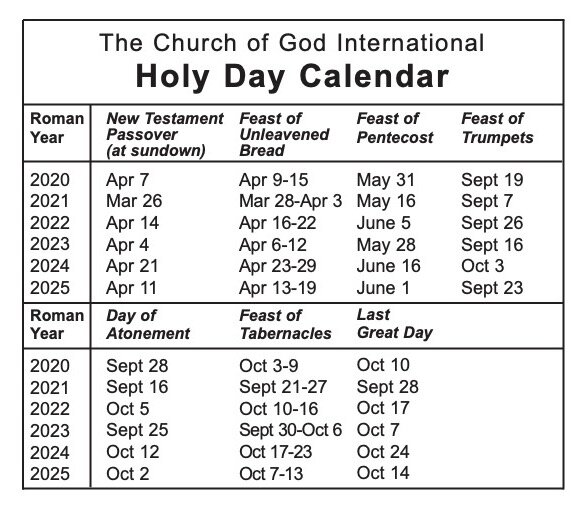Christian Holidays and Observances in 2025: A Comprehensive Guide
Related Articles: Christian Holidays and Observances in 2025: A Comprehensive Guide
Introduction
In this auspicious occasion, we are delighted to delve into the intriguing topic related to Christian Holidays and Observances in 2025: A Comprehensive Guide. Let’s weave interesting information and offer fresh perspectives to the readers.
Table of Content
Christian Holidays and Observances in 2025: A Comprehensive Guide

The Christian faith, with its rich history and diverse traditions, observes numerous holidays and observances throughout the year. These events serve as opportunities for reflection, celebration, and remembrance, deepening the spiritual connection of believers and fostering a sense of community. While specific dates may vary depending on the liturgical calendar followed by a particular denomination, the core themes and significance of these celebrations remain consistent.
This comprehensive guide outlines the major Christian holidays and observances anticipated in 2025, providing insight into their historical context, theological significance, and contemporary practices.
Major Christian Holidays and Observances in 2025
1. Advent (Sunday, November 30, 2024 – Saturday, December 24, 2024)
Advent, derived from the Latin word "adventus" meaning "coming," marks the four weeks leading up to Christmas. This period of anticipation and preparation focuses on the coming of Jesus Christ, both his first advent as a human baby and his second advent at the end of time. During Advent, Christians engage in practices like daily scripture readings, prayer, fasting, and lighting Advent wreaths as symbols of hope and anticipation.
2. Christmas (Wednesday, December 25, 2024)
Christmas, the most celebrated Christian holiday, commemorates the birth of Jesus Christ in Bethlehem. It is a time of joy, feasting, and gift-giving, symbolizing God’s love for humanity and the promise of salvation. Churches hold special services, families gather for meals and traditions, and the story of the Nativity is often re-enacted through carols, plays, and other artistic expressions.
3. Epiphany (Friday, January 6, 2025)
Epiphany, meaning "manifestation," celebrates the revelation of Jesus Christ as the Son of God. This event is traditionally associated with the visit of the Wise Men from the East, who followed a star to find the newborn king. Epiphany also commemorates Jesus’ baptism by John the Baptist and the miracle at Cana, marking the beginning of his public ministry.
4. Lent (Wednesday, February 19, 2025 – Thursday, April 2, 2025)
Lent, a period of forty days (excluding Sundays), is observed as a time of fasting, prayer, and repentance in preparation for Easter. It commemorates Jesus’ forty days of fasting in the wilderness before beginning his ministry. During Lent, Christians engage in practices like giving up certain indulgences, focusing on spiritual disciplines, and reflecting on their relationship with God.
5. Palm Sunday (Sunday, March 29, 2025)
Palm Sunday marks the triumphant entry of Jesus into Jerusalem, where he was greeted by crowds waving palm branches. This event foreshadows his role as the Messiah and the ultimate sacrifice he would make on the cross. Churches often hold processions with palm branches, reciting the Passion narrative and remembering Jesus’ journey toward his crucifixion.
6. Holy Week (Sunday, March 29, 2025 – Saturday, April 4, 2025)
Holy Week encompasses the final week of Jesus’ earthly life, leading up to his crucifixion and resurrection. It includes Palm Sunday, Holy Monday, Holy Tuesday, Holy Wednesday, Maundy Thursday, Good Friday, and Holy Saturday. Each day holds its own significance, reflecting on Jesus’ teachings, betrayal, trial, suffering, and death.
7. Maundy Thursday (Thursday, April 2, 2025)
Maundy Thursday commemorates the Last Supper, where Jesus shared a meal with his disciples and instituted the sacrament of Holy Communion. The name "Maundy" derives from the Latin word "mandatum," referring to the commandment Jesus gave his disciples to love one another. Churches often hold special services with foot-washing ceremonies symbolizing humility and service.
8. Good Friday (Friday, April 3, 2025)
Good Friday marks the day of Jesus’ crucifixion and death on the cross. It is a solemn occasion of mourning and reflection on the sacrifice Jesus made for humanity’s sins. Churches hold somber services focusing on the Passion narrative, often including the reading of the Seven Last Words of Christ.
9. Holy Saturday (Saturday, April 4, 2025)
Holy Saturday is a day of waiting and anticipation, marking the time between Jesus’ death and his resurrection. It is a day of quiet reflection and prayer, symbolizing the darkness before the dawn of Easter.
10. Easter Sunday (Sunday, April 5, 2025)
Easter Sunday is the most significant Christian holiday, celebrating the resurrection of Jesus Christ from the dead. It signifies victory over death, the promise of eternal life, and the hope of a new beginning. Churches hold joyous services, often featuring elaborate decorations, special music, and the sharing of the Easter message.
11. Ascension Day (Thursday, May 14, 2025)
Ascension Day commemorates Jesus’ ascension into heaven forty days after his resurrection. It marks the completion of his earthly ministry and his return to God the Father. Churches often hold special services focusing on the themes of Christ’s triumph and the promise of the Holy Spirit.
12. Pentecost (Sunday, May 24, 2025)
Pentecost, fifty days after Easter, celebrates the descent of the Holy Spirit upon the disciples. It marks the birth of the Christian church and the empowerment of believers to spread the Gospel. Churches often hold special services with symbolic fire and wind, symbolizing the power of the Holy Spirit.
13. All Saints’ Day (Tuesday, November 1, 2025)
All Saints’ Day is a day for honoring all the saints, both known and unknown, who have gone before us. It is a time of remembering their lives of faith and service and celebrating their eternal presence in heaven. Churches often hold special services with readings of saints’ lives, hymns, and prayers of thanksgiving.
14. All Souls’ Day (Wednesday, November 2, 2025)
All Souls’ Day is a day for remembering and praying for the dead, especially those who have passed away in the past year. It is a time of offering prayers for their souls and seeking their intercession for the living. Churches often hold special masses with prayers for the departed, offering comfort and hope to those who mourn.
Significance and Benefits of Christian Holidays and Observances
Christian holidays and observances hold immense significance for believers, serving as opportunities for:
- Spiritual Reflection and Growth: These events provide a structured framework for examining one’s faith, deepening understanding of biblical teachings, and fostering a closer relationship with God.
- Community Building: Shared celebrations and rituals strengthen bonds within the church community, promoting fellowship and mutual support.
- Cultural Preservation: These events transmit traditions, stories, and values across generations, preserving the rich heritage of the Christian faith.
- Ethical and Moral Guidance: The teachings and events commemorated during these holidays offer ethical and moral guidance for living a life of love, compassion, and service.
- Hope and Encouragement: Christian holidays and observances offer hope and encouragement during times of difficulty, reminding believers of God’s love and promise of eternal life.
FAQs about Christian Holidays and Observances in 2025
1. Why do Christian holidays and observances vary in date?
The dates of Christian holidays and observances are primarily determined by the lunar calendar and the calculation of Easter, which falls on the first Sunday after the first full moon on or after the vernal equinox. As a result, the dates of other holidays, like Lent, Palm Sunday, and Ascension Day, are calculated relative to Easter.
2. What are the differences between the various denominations’ observance of these holidays?
While the core themes of Christian holidays remain consistent, different denominations may have variations in their liturgical practices, rituals, and specific observances. For example, some denominations may place greater emphasis on certain holidays, while others may observe them in a more understated manner.
3. How can I learn more about the significance of these holidays?
Numerous resources are available to deepen your understanding of Christian holidays and observances, including:
- Your local church: Speak with your pastor or other church leaders for insights into the specific traditions and practices of your denomination.
- Christian books and websites: Explore books and websites dedicated to Christian holidays and observances, providing historical context, theological explanations, and practical tips for observing them.
- Bible study groups: Engage in Bible study groups focusing on the biblical passages related to the holidays and observances you wish to learn about.
Tips for Observing Christian Holidays and Observances in 2025
- Engage in prayer and reflection: Dedicate time to prayer and reflection on the themes and messages associated with each holiday.
- Attend church services: Participate in special services and events organized by your church, fostering a sense of community and deepening your spiritual connection.
- Share with family and friends: Involve your family and friends in celebrating these events, sharing traditions and creating lasting memories.
- Engage in acts of service: Express your faith through acts of kindness and service to others, reflecting the teachings of Jesus Christ.
- Learn about the history and significance: Research the historical context, biblical passages, and theological significance of each holiday to gain a deeper understanding.
Conclusion
Christian holidays and observances offer a unique opportunity to connect with the rich history and enduring message of the faith. By engaging in these celebrations, believers can deepen their spiritual understanding, strengthen their relationship with God, and contribute to the vibrant tapestry of the Christian community. Whether it is the joy of Christmas, the solemnity of Lent, or the hope of Easter, these events provide a framework for living a life of faith, love, and service.








Closure
Thus, we hope this article has provided valuable insights into Christian Holidays and Observances in 2025: A Comprehensive Guide. We appreciate your attention to our article. See you in our next article!